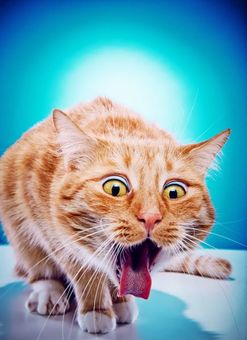After several months to years most cats experience weight loss.
Cat vomiting food daily.
Sometimes cat vomiting is caused by a rapid change in their diet.
If your cat also has food allergies they need a limited ingredient diet.
A cat may reject the opportunity to eat cold food.
Food is too cold.
For instance treatment for feline inflammatory bowel disease includes medication.
This will upset the stomach.
If your cat has kidney disease your vet may recommend blood pressure medication and increasing fluid intake.
Never feed a cat food straight from the refrigerator.
How you can help a vomiting cat.
Try switching back to the old food to see if your cat s vomiting stops.
Both can result in a cat vomiting anywhere from twice per month to even daily.
Try going back to the previous food and re introducing the new food on a gradual basis.
The cat will run and jump.
A symptom that may be indicative of a more serious condition is blood in the vomit which can signal an ulcer or cancer.
If you have recently switched from wet cat food to dry cat food for example this could cause your cat to vomit.
Symptoms of cat vomiting include heaving retching and the expulsion of partially digested food.
A diet rich in fiber regular brushing and the occasional consumption of malt can prevent hairballs in cats from posing a problem.
Cats may continue to vomit even when there is no food material in the stomach resulting in a clear to yellow foamy material.
In many cases cat vomiting can be prevented.
If this is the root cause the vomiting should eventually subside.
Although often attributed to aging weight loss occurs because the intestinal wall loses its ability to absorb the digested nutrients from the cat s food.
We must first distinguish whether your cat is vomiting up food or hair.
The treatment for your cat s vomiting depends on the underlying cause.
An often overlooked cause of vomiting is a change in a cat s diet.
Due to a cat s daily grooming routine it is normal that it will ingest a lot of hair which will sometimes be expelled through vomiting.
Food allergies and food intolerances.
This is unappealing and difficult for your cat to digest.
If you ve recently changed your cat s food added new foods or even started a course of feline medication nausea and or indigestion may result.
Simple changes such as feeding a high quality cat food that doesn t contain an allergy producing protein and making sure that any poisonous plants and chemicals are removed from your home are great ways to start.
Any food yet to be digested will be expelled as vomit.

